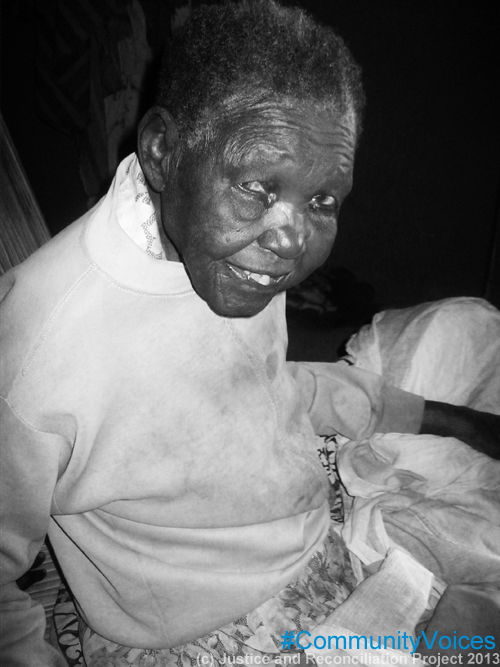In the last #CommunityVoices the vehicle Atiku George was travelling in attacked and looted by rebels. After being hospitalised for months, Atiku was left in a wheelchair. We continue his story here.
As if that was not enough, while Atiku was just trying to pick up the pieces of his life, another tragedy befell him. On 8th March 2005, at 11pm after celebrating the international women’s’ day, the rebels attacked Dzaipi village killing and abducting an unknown number of people. It is common practice in the area that during dry seasons, most of the villagers prefer to sleep outside their houses on the compound as a way of dealing with the heat. It was during such a period when the rebels came and chopped the sleeping villagers using pangas and axes to death. The rebels attacked the home of George, killed his sister, tortured two of his sons Owala Nickson and Yata Dominic and abducted his 14 year old daughter Dorothy Onziya who is still missing up to date.
“This incident has really twisted my life in a wrong way,” laments Atiku as he thinks about the impact it has had on his life. Initially a wealthy business man, he lost all his property and money during the attack and on hospital bills making it difficult to take care of his family and pay fees for his children. Yet he requires medical attention as his remaining leg is continuously becoming week because of the foreign fragments that entered during the land mine attack. One month after the memorial, on our way to Adjumani, we learnt that Atiku is now bed ridden as his surviving leg has become to swollen with lots of pain. This requires surgery which he cannot afford. His two sons who were tortured by the rebels have since failed to recover and are having mental problems that has hindered them from going to school. Atiku is constantly traumatised and depressed because of his loss yet he does not know the fate of his daughter Dorothy.
“Honestly the rebels killed my sister, abducted my daughter whom I even don’t know whether is alive or dead. Then I have two mentally ill children as a result of the torture by the rebels whom I have to take care of in the state I am in. God is not fair at all.”
Atiku desperately wishes to get information about the fate of his daughter. “The loss of my daughter who is unaccounted for drives me crazy; I need accountability for my daughter,” he says. He hopes that government can compensate him for the loss of property to enable him to start a small business that can facilitate him to take care of his home and pay fees for his children.
“These children need to go to school yet I am their father and I cannot meet their needs,” laments Atiku. Because of the disability, he cannot do any heavy work and yet he requires urgent medical attention for a surgery to save his remaining leg and his life as he lies bedridden in his house.
Unlike other LRA affected areas such as in Acholi, Lango and Teso, in West Nile and specifically Adjumani District, there exist no civil society initiatives to help these communities recover from the effects of the conflict. It is no wonder that during the memorial prayers, Fr. Rapheal Ayiga, the parish priest of Dzaipi presented a memorandum to the Woman Member of Parliament for Adjumani district appealing for government and civil society intervention in the district to help the victims of conflict. He specifically mentioned the need for a rehabilitation centre in the sub county to support survivors like Atiku to aid their recovery. It’s my hope and prayer that victims like Atiku will find answers to the immense challenges that they are facing as a result of conflict in northern Uganda.
#CommunityVoices collects; preserves and makes accessible personal and collective accounts on experiences and highlights transitional challenges of communities affected by decades of conflict in northern Uganda. It’s our hope that this blog will serve as a medium for communities to share their experiences and for the public to appreciate the transition challenges that they go through


